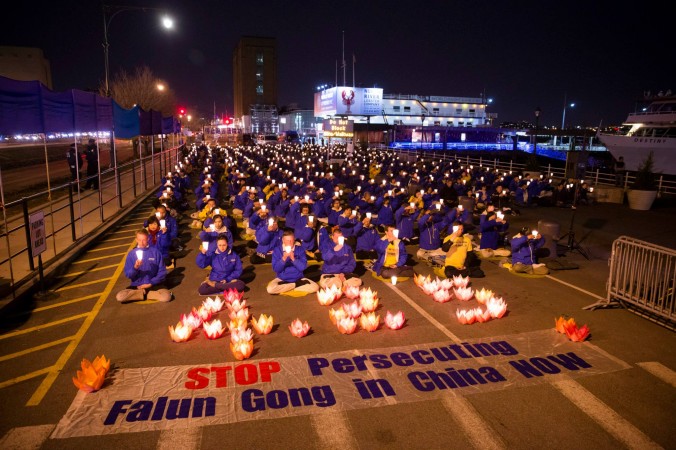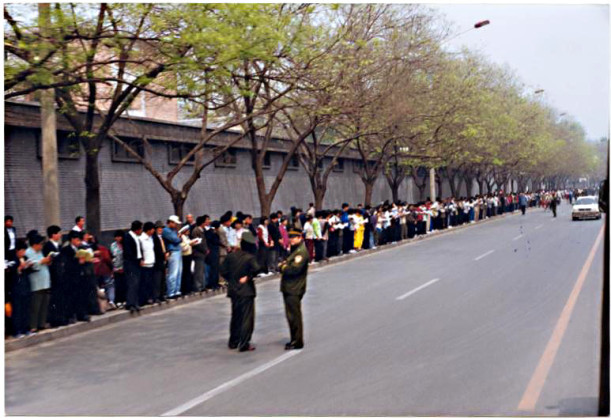
5 Facts Debunk April 25th Zhongnanhai Siege
[Photo Caption: Practitioners of Falun Gong, a spiritual practice persecuted in China since 1999, hold a candlelight vigil to end the persecution near the Chinese Consulate in Manhattan, New York, on April 25, 2015. (Edward Dai/Epoch Times)]
Chinese Communist Party (CCP) officials often cite the events of 25 April 1999 as the reason they began to suppress Falun Gong, claiming that there was an organized “siege” against the government which proved Falun Gong was seeking political power. Foreign governments and media organizations still largely accept the CCP’s narrative.
What took place at Zhongnanhai on 25 April 1999, was a significant turning point for Falun Gong in China; but, was it a “siege” organized by Falun Gong, acting in collusion with “foreign forces” against the Chinese government, in turn prompting a retaliatory persecution campaign, or is that justification mere propaganda? The following 5 facts debunk the CCP’s story.
-
Government officials in Tianjin asked practitioners to appeal to Beijing
The events leading up to the appeal in Beijing started several days before in Tianjin, where a newspaper published a misleading and slanderous article about Falun Gong, leading practitioners to peacefully protest in front of the editorial offices. Security officials arrived, broke up the protest and arrested several practitioners. Tianjin officials told protestors to appeal to the central government in Beijing.
-
The appeal was not an organized protest against the government
After launching the persecution in July of 1999, Jiang Zemin claimed that the April 25th appeal was an organized event with foreign forces behind it. In reality, of the estimated one hundred million Falun Gong practitioners in China at the time, only ten thousand, or 0.01%, were present. Practitioners from Tianjin, joined by a small number of those local to Beijing, came to appeal for the release of the Tianjin detainees. There is no evidence, such as electronic communications records, to show that anyone tried to organize a large-scale event. Furthermore, the appeals were not directed against the government in any way; rather, they actually requested help from the government.
-
Falun Gong was not competing for political power
Elements of the persecution began as early as 1996. On 25 April 1999, practitioners appealed to have their rights restored, not to compete for political power. In 1996, China banned Falun Gong books from publication, and security organizations conducted round after round of investigations of Falun Gong, all of which concluded that there were no illegal or harmful activities taking place. Falun Gong teachings have always maintained that politics have no place in cultivation. Jiang Zemin, looking for a reason to crack down on Falun Gong, dishonestly claimed there were political motives behind the appeals.
-
The appeal was not a siege

Falun Gong practitioners peacefully appeal in orderly fashion at Zhongnanhai on April 25th, 1999. Falun Gong practitioners at Zhongnanhai made peaceful appeals and were careful not to obstruct any activities on the streets or sidewalks. They did not chant, threaten or use violence of any kind. They simply requested an audience with Beijing officials who could help them resolve the unfair treatment they experienced in Tianjin and restore their right to peacefully practice Falun Gong. Once their requests were heard and thought to be resolved, everyone walked away calmly.
-
The incident was resolved peacefully and successfully by both sides
Chinese Premier Zhu Rongji offered to meet with a representative group of appellants. They asked for the release of practitioners in Tianjin and an assurance of freedom to continue practicing Falun Gong. Premier Zhu agreed and the issues appeared to be resolved to the satisfaction of all parties. It was only weeks later, that the events were re-interpreted and cited as reason to launch the persecution against Falun Gong.
Source
-
Fa Teaching at the 2013 Western U.S. Fa Conference
(en.Minghui.org/html/articles/2013/10/31/142936.html) -
Behind the April 25 Incident
(Faluninfo.net/article/518/Behind-the-April-25-Incident/?cid=4) -
Standing Up for Their Faith: How the April 25 Appeal Changed China
(www.TheEpochTimes.com/n3/1339339-standing-up-for-their-faith-how-the-april-25-appeal-changed-china/)
